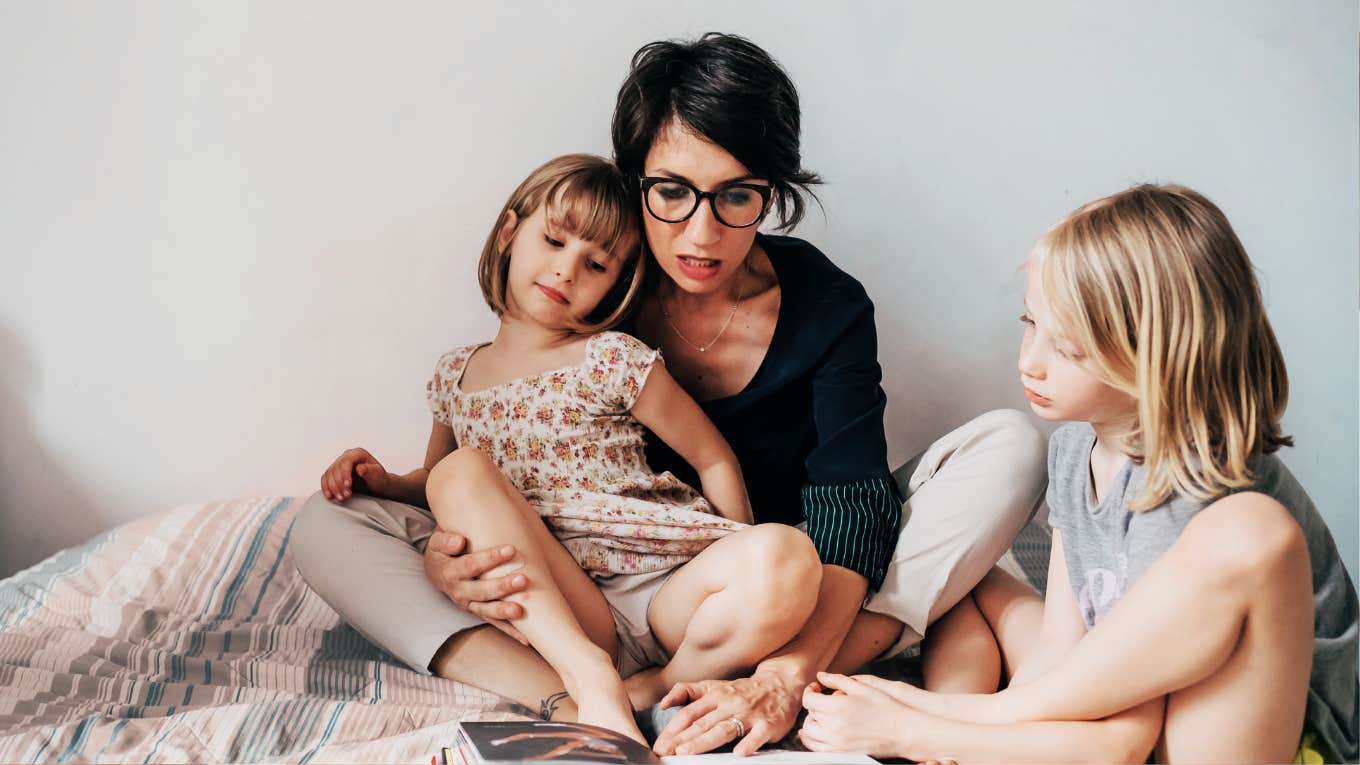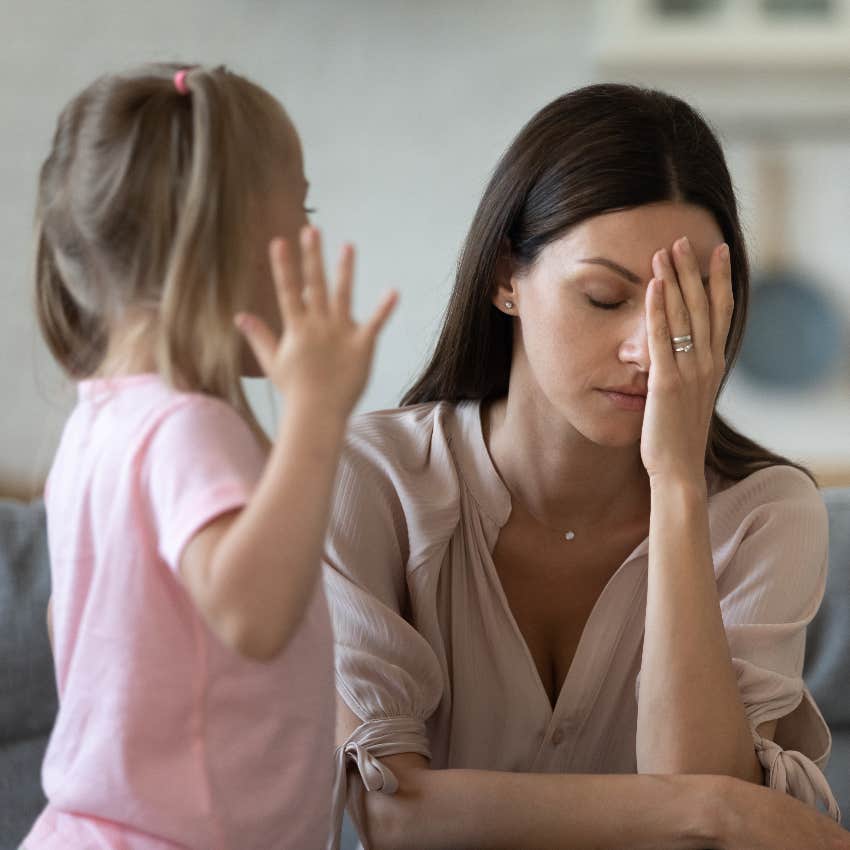I'm A Mom Of Two — Here's Why I Finally Stopped Listening To Parenting Experts
After years spent obsessing over everything I was doing “wrong” and believing other people knew better, I learned to trust my own instincts instead.
 Eugenio Marongiu | Canva
Eugenio Marongiu | Canva My daughter was 37 weeks in the womb when she first defied me, ruining my birth plan by flipping around and lodging her head in my rib cage. As a baby, she vocally challenged any and all attempts at a bedtime routine; as a toddler, she was forever plotting her escape.
From Day One onward, I felt completely out of my depth. I had always been a compliant child, and my daughter’s insistence on opposition bewildered me.
Back then, I turned to parenting books for help, which initially offered slivers of hope and inevitably made me feel worse. I once found myself standing outside my daughter’s bedroom door, holding the knob firmly in place while she wailed and pounded from the other side.
“This can’t be right,” I told myself. It was exactly what the “expert” who wrote Setting Limits with Your Strong-Willed Child told me to do, but it just felt so… wrong. I knew the authors of these books were trying to be helpful — well, that and make some money in the process.
But even when I found myself vigorously nodding throughout various parenting book chapters, my attempts to apply their tidy scenarios to real life never seemed to pan out.
Usually, I just didn’t have enough time. Validating feelings was all well and good, but when it was 7:32 a.m. and I had an 8:30 work meeting, and I still had five bags to schlep to the car, three car seat straps to buckle, and a daycare drop-off to do, I wasn’t interested in my daughter’s sentiments about the injustice of being unable to go barefoot in December.
Even if there was time, when faced with the reality of a tantrum, or the immediate threat of one, I tended to go into panic mode, drawing a total blank when it came to the contents of whatever book I’d just spent the last month fervently underlining.
 fizkes | Shutterstock
fizkes | Shutterstock
If I did manage to pluck something from a parenting book page, it rarely worked.
When my daughter forcefully requested a cookie before breakfast, I tried to give her in fantasy what I couldn’t give in reality, as advised in How to Listen So Kids Will Talk. I described in vivid detail the brownie ice cream sundae I wished I could give her — if only it weren’t 6 a.m.
“Mom… stop,” she said, in the exasperated tone I was coming to know all too well.
My “favorite” tidbit of advice was to refrain from yelling at my kids. I understood the rationale — when a child sees they can provoke such a strong reaction from you, it gives them power.
But what the people who give this advice seem to conveniently forget is that parents are also human beings. Not only that, we are human beings who are grappling with an inordinate amount of stress, frequently pressed for time, and chronically deprived of sleep.
I’m not much of a yeller by nature, but that doesn’t mean I don’t have my breaking point. I spent years consumed by guilt, wracked with worry over the trauma I was inflicting on my children by occasionally losing my temper.
Why couldn’t I get it right? According to their back covers, these parenting books were transforming every parent’s life except for mine.
I was hopeless when it came to following through on my threats, I could never manage to successfully de-escalate a conflict, and I sucked at establishing clear boundary lines. I was even failing at the “easy” things, like giving my kids allowance and being the Tooth Fairy. I could never seem to manage to get to the ATM.
I fully expected my daughter to experience a stormy adolescence, but I wasn’t quite prepared for the storms to descend at the beginning of her fifth-grade year.
My saving grace for so many years was that she’d been universally adored at school. Whip-smart, full of spunk, and more or less respectful of the boundary lines established by anyone other than her mother. Until the fifth grade. Suddenly everyone was out to get her, no one in charge had any idea what they were doing, and everything was friggin’ stupid.
I realized that in a month, I’d become the parent of the “problem child.” Being the parent of a problem child, I quickly learned, was an unenviable position. It was also a lot of friggin' work.
I wasn’t used to teachers and school counselors calling and emailing me at all hours of the day. I didn’t know what to say to them because I was as bewildered as they were.
My daughter was angry with me, along with almost every other adult in her life. Maybe it had something to do with the fact that we were born back in the 1900s and therefore didn’t know anything. A desperate Amazon search revealed 824 results for “parenting books about adolescence,” and some of them did look tempting.
But even if I did dip my toes in the waters of “self-help for parents of adolescents,” I promised I’d be gentler on myself this time around.
Not only was I wiser and less insecure, but in the intervening years, I’d learned there is no “one-size-fits-all” formula for parenting.
I learned it the hard way because that is the way we tend to learn things. What worked for my parents might not work for me. What worked for my son might not work for my daughter.
Every child is different, every parent is different, every child-parent dynamic is different, every family is different, every child and parent goes through different seasons, and every generation faces different challenges.
It was my son who helped me gain confidence in my parenting skills because he listened to me from time to time. As he emerged from his own toddlerhood and my daughter hit her stride in elementary school, I began to shift my focus from the things I sucked at to the things I naturally did well.
I realized there were lots of things I was doing well as a parent, without any guidance.
Maybe I struggled with setting limits during a heated moment, but I was awesome at establishing rituals and routines. I’d always thrived on them, and my kids thrived on them too. We had our nightly family dinner, post-dinner show, and bedtime reading. We had our weekend walks, Saturday housecleaning “power hours,” and Sunday sundaes.
Some rituals changed with the seasons, some flopped, and some fizzled out. But when we landed on one we all enjoyed, or could at least tolerate, it helped to set expectations without constant negotiation. It’s the win-win for the children and parents that I’m always looking for — something that’s good for them but also alleviates, rather than adds to my already-significant mental load.
In that vein, I’ve long let our kids play freely up and down our street and encouraged them to knock on neighbors’ doors. Research shows free play is incredibly beneficial, and it’s even better when they can recruit other kids to join them. And even better yet, no one — including me — needs to get in the car.
For the two precious years that my kids attended the same school, they walked the nine blocks all by themselves, learning critical life skills and reaping the mental health benefits of walking in the process. After spending over 2,000 hours of my life carting them to and from school and daycare (yes, I tallied it up), I was able to reclaim that time for myself — not just the hours, but also the energy that tends to get sapped when you schlepp kids around.
Not all parents live in neighborhoods that are walkable or safe enough, I know. At the end of the day, it’s about using the strengths and resources we have at our disposal.
I had been feeling pretty good about my parenting skills — that is, until a couple of years ago when the teachers started calling.
I already knew we were in a transitional phase. For quite a few months, my daughter no longer wanted to “play” out front (she was too old to play), no longer wanted me to read to her before bed (she wasn’t a baby, for crying out loud), no longer wanted to participate in the family cheer we did before our Saturday power hour (it was embarrassing and dumb).
I found some of my old insecurities rising to the surface, especially as the newly appointed parent of the “problem child.” Particularly as a mother, I’m conditioned to default to guilt, and I was conditioned to feel that her behavior in class was, first and foremost, a reflection on me.
It’s the same guilt I instinctively feel when guests arrive unannounced to a messy house or when a stranger at the park gives me the side-eye because my daughter is barefoot in December. Whatever it is, it’s always mostly the mother’s fault. Honestly, though, who cares?
My daughter was entering a new season of childhood, and I was entering a new season of parenthood. I knew I’d have to try some new things and see what stuck. And even then, I had to keep in mind that what worked one day might not work next year or even next month.
Adolescence is a turbulent journey, and I still yell from time to time. I still feel at a loss. I still get my feelings hurt.
Maybe so-called 'parenting experts' can give me a few new tools for my toolbox. But I also know they have no secret formulas, no magic bullets to offer me, no matter how persuasively their books are marketed.
And besides, they haven’t met my daughter.
Kerala Taylor is an award-winning writer and co-owner of a worker-owned marketing agency. Her weekly stories are dedicated to interrupting notions of what it means to be a mother, woman, worker, and wife. She writes on Medium and has recently launched a Substack publication Mom, Interrupted.

